History of this book¶
This book is the result of the collaborative effort of many people. A lot of the content was written during two book sprints held in 2009 and 2010 in Tahoe, USA. Many contributions have also been made by individuals in the times between and following these sprints.
Fifth edition¶
The fifth edition was written at the Woolman Sierra Friends Centre (woolman.org) in April 2012. Woolman use and contribute to CiviCRM. We are grateful for their hospitality.
Fourth edition¶
The forth edition was written in Bourne, Lincolnshire, UK in September 2011. We were too busy writing this edition to say much about how it was put together.
Third edition¶
This edition includes minor updates to reflect changes in CiviCRM 3.3 which was released in December 2010. It is being published on the eve of the second annual CiviCon conference. Thanks to the generous contributions of our CiviCon Sponsors (listed in the front of the book) - a copy has been provided to each conference participant.
Second edition¶
The second edition of the CiviCRM manual was published after a four-day Book Sprint organised by CiviCRM and led by Adam Hyde (FLOSS Manuals). The sprint was sponsored by the Information Program initiative of the Open Society Institute (http://www.soros.org/initiatives/information). We are especially grateful to Janet Haven for pushing this forward.
The second edition includes new sections on CiviReports, CiviCase, CiviEngage and Extending CiviCRM. This edition also included an extensive rewrite of nearly every section of the text, including a reorganization of all sections to break up information into Introduction, Planning, Configuration and Everyday Tasks sections, the latter to serve as an easy-to-follow user manual for individuals working with CiviCRM on a daily basis.
We also added an entire new section to assist developers in getting into the code. Finally, we updated the book to match CiviCRM 3.2 (which was a few weeks away from release at the time of writing).
We think that the reorganisation adds a lot to the book and increases it's readability because it helps people who work with CiviCRM in a specific capacity get directly to the chapter relevant to them.
The following photo shows the people who worked on this second edition of the book.
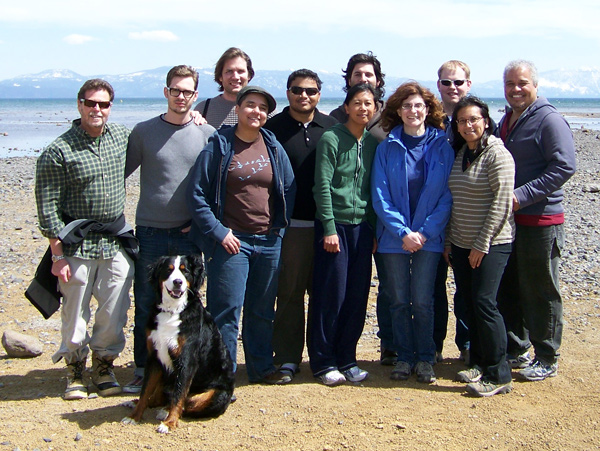
In the back row, starting from the left, you are looking at Dave Greenberg (San Francisco, USA), Kyle Jaster (NY, USA), Xavier Dutoit (Geneva, Switzerland and Brussels, Belgium), Kurund Jalmi (Mumbai, India), Michael McAndrew (London, UK), Wes Morgan (Washington DC, USA), Josue Guillen (DC, USA). The front row from the left is Jack Aponte (NY, USA), Mari Tilos (San Francisco, USA), Sarah Gladstone (Chicago, USA), and Alice Aguilar (NY, USA).
First edition¶
The first edition of this manual was written during a five-day book sprint organised by CiviCRM and led by FLOSS Manuals. The sprint was sponsored by the Information Program initiative of the Open Society Institute**(http://www.soros.org/initiatives/information.)), and again, we are especially grateful to Janet Haven for pushing this forward.
Having secured sponsorship, the CiviCRM Core team invited a group of people from around the globe to gather for a week at Lake Tahoe in California. The modest goal was to transform our diverse experience of CiviCRM into a manual that we hope will help people to use this great piece of software. This turned out to be an interesting, and at times difficult, challenge.
The following photo shows the people who wrote this book.
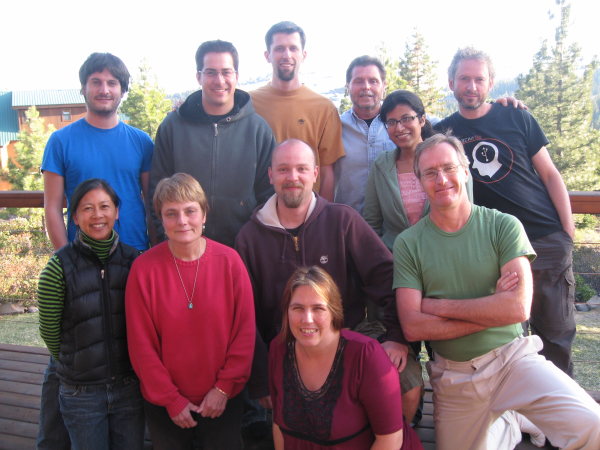
In the back row you are looking at Michael McAndrew (London, UK), Tony Guzman (Salt Lake City, USA), Brian Shaughnessy (Albany, NY, USA), Dave Greenberg (San Francisco, USA), Yashodha Chaku (Mumbai, India) and Adam Hyde (Berlin, Germany). In the front row are Mari Tilos (San Francisco, USA), Cynthia Tarascio (Philadelphia, USA), Michal Mach (Warsaw, Poland) and Peter Davis (Wellington, New Zealand). In the very front is Eileen McNaughton (Wellington, New Zealand).
We came from different backgrounds, used CiviCRM in different ways, and worked with very different organisations. It was often a challenge to meld these perspectives into a cohesive whole, but we hammered away at it and we think this made for a better book. We had some lively discussions about important issues, such as whether there is a "z" or an "s" in organis/zation or a "q" in check/que, and finally agreed to use both spellings in the spirit of internationalism. We also struggled with the word "constituent", which is core to the non-profit sector in America but was unfamiliar to those of us from outside America.
It was a pretty intense five days. Adam (our friendly Floss manuals taskmaster) kept us realistic, on track, and hard at work - even hauling us back to work after dinner each evening. Overall it was both fun and productive and we really appreciate the way Adam helped us actually produce a book within a week. Thank you.
For most of us, however, the highlight of the week has been the breathtaking cuisine cooked by Jill Klein (http://www.partiesthatcook.com/about-us/). We love you, Jill, and wish we could take you home with us. We are also grateful to Dave Greenberg, Bob Concannon and Mari Tilos for their hospitality, and to Scout (aka "CiviDog") just for being there.

We had help from around the world during the preparation process, and over the course of the Sprint. Andy Oram helped us both in the planning process and then with editing and feedback during the Sprint. We also had a number of people log in to write and edit the manual during the Sprint. They include Robert Santiago, Xavier Dutoit, Joe Murray, Sarmeesha Reddy, Jay Maechtlen, Dream Gomez, Leila Johnson, Duncan Hutty, and Kurund Jalmi.
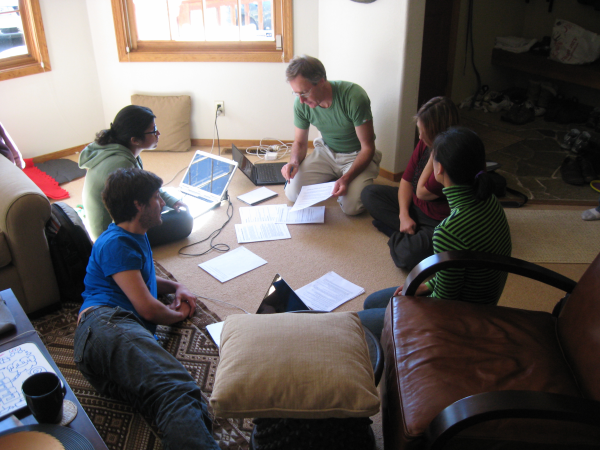
Our office for the week was Dave and Bob's house.
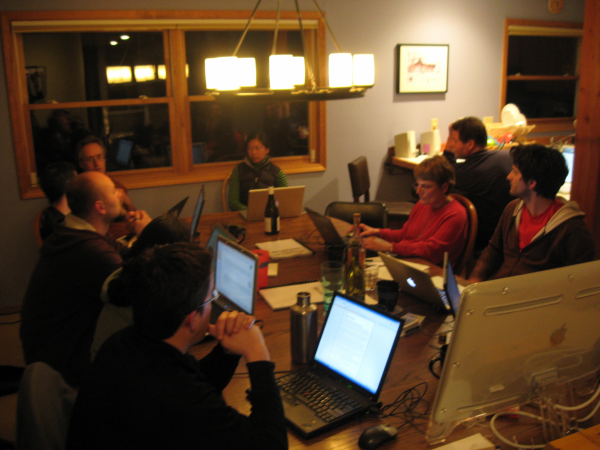
We mitigated the hardship of late-night work with some tasty beverages.
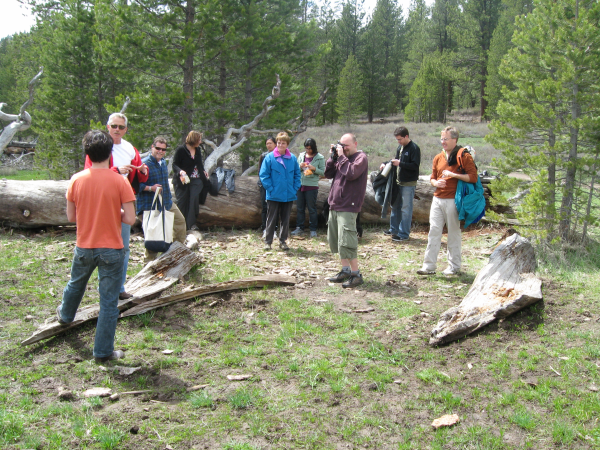
And occasionally they let us out for a bit....